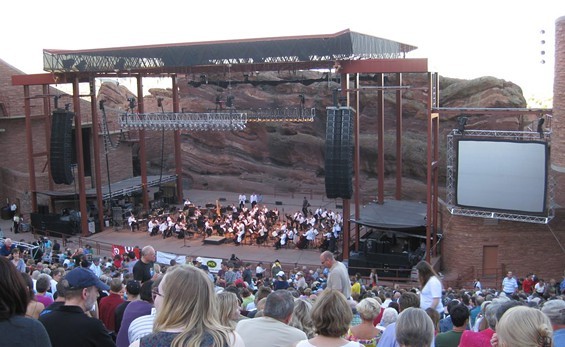
By: Chris Walker
“Do you have anything that goes well with Beethoven?”
The clerk at the Denver Wellness Center looks at me strangely, before motioning me over to a display case full of various THC-infused candies and baked goods.
“Well,” he says. “We got weed cookies, gummies, lollipops, chocolate…I think any of them should work fine.”
“Right,” I say, squinting and pointing towards a tin-foil wrapped chocolate bar. “So you're sure that one pairs nicely with classical music?”
I want to have the proper goods. Tonight I'm going to Red Rocks Amphitheatre near Denver to see the Colorado Symphony Orchestra's end of summer concert. Normally that wouldn't require a visit to a pot dispensary beforehand, but this show is the symphony's first public performance in partnership with the cannabis industry, which ponied up nearly $130,000 to sponsor the Symphony's “Classically Cannabis” series.
]

Coming from Los Angeles, where everyone is watching how Colorado's great pot experiment unfolds, this seemed a perfect way to investigate how marijuana is changing the cultural landscape of even the most conservative of intuitions — classical music.
The cannabis series has drawn praise — and criticism — for the Colorado Symphony, which lost at least 20 prominent donors when announcing the partnership. But the symphony's CEO Jerry Kern has teamed up with Big Marijuana to help save a sinking ship.
When the 77-year-old ex-lawyer and Playboy CEO took charge of the Colorado Symphony in 2011, the symphony was nearly bankrupt and $1.2 million in debt, in part because six and seven figure donations from rich folks had dropped off since the recession.
Of course the much larger, continuing problem facing symphonies around the world – not just Colorado's — is a dwindling audience for classical music. Let's be honest: Most young people and millennials — such as myself — just don't listen to classical music that much (if at all).
In 1937, the median age at classical concerts was around 30. Now, according to New York City's classical station WQXR, the median age is 73. And though the Colorado Symphony has drawn some younger crowds by collaborating with artists like DeVotchKa, the symphony's Senior Vice President of Innovative Programming, Tony Pierce, acknowledges that they can't keep relying on pop artists.
Classical music remains an orchestra's artistic bread and butter. But if that's the case, how do you get young and new audiences to those shows?
Marijuana, that's how.
At least, that was the idea behind September 13's “High Note” show at Red Rocks.
I happen to fit right into their target demographic: a 25-year-old who recreationally tokes from time to time. I also appreciate classical music, but almost never choose to listen to it over rock, hip-hop or even jazz.
So I wonder: Would getting high at a classical concert get me hooked on Brahms? Would I want to come back for a Mahler fest? Could I get pumped on Debussy?
[
I arrive at the Red Rocks parking lot just around sunset. Accompanying me is Rachel, a friend who lives in Colorado. After the army of yellow-vested attendees guides us into stacked parking, we take our edibles. It's 7:15 p.m.
Rachel bites into her snickerdoodle. I try measuring off two squares from my espresso-flavored chocolate bar, only to discover the whole thing has melted. I make a conservative guess. From that moment, we figure we've got 45 minutes before the THC kicks in, although we bring the rest of the chocolate bar with us in case we need more.
I scan for weed-related activity in the parking lot, but most of the crowd is about what you'd expect at a classical music concert: grey-haired geriatrics hobbling towards the amphitheater on strained hips and walkers.
It's not until we're inside the venue that we see any solid evidence of the cannabis partnership. At the top of the amphitheater are a few tents with dispensary employees handing out 10 percent off coupons and glow sticks. Despite cannabis being the official sponsor, people can't buy it at Red Rocks, because Colorado's 64th amendment bans public consumption of marijuana. A dispensary employee says he hopes that this will change in the future.
Rachel and I look for seats in one of the middle rows of the amphitheater, and settle in just as the conductor takes the stage.
“The Colorado Symphony thanks Edible Events Co., and our sponsor, Bhang Medicinal Chocolate,” booms the conductor, Scott O'Neil.
A few in the audience whoop like they're at a frat party. Most chuckle lightly, nudging each other like they're in on a dirty joke. Clearly, the idea of a weed partnership is not being taken very seriously yet.
The first piece starts, “Short Ride in a Fast Machine,” by contemporary composer John Adams. I can just feel the beginning of my edible kicking in. The acoustics of Red Rocks are amazing. It seems like sound is coming from the rocks themselves surrounding the amphitheater, a crescendo of strings clashing against each other in swift, atonal chords.
After a selection from Beethoven's Fifth and a piece by Mascagni, the orchestra launches into the score from the movie There Will Be Blood, composed by Radiohead guitarist Jonny Greenwood.
I'd seen the film before but forgot how trippy the score is, with violin and cello sounds aching and bending under tremendous, dissonant strain. I suddenly feel like my head is being split in two.
“Someone really knew how to fuck with us.” Rachel says.
I'm looking for any source of distraction until I remember — oh yes — my sandwich! I don't know if everything is oversized in Colorado, but when I ordered the “large” sub sandwich at a deli on our way to Red Rocks, I was handed a 14-inch cylinder of bread and meat and veggies so hefty, I might as well have been carrying a set of architectural plans into a construction site.
“There's no possible way you'll eat the whole thing.” Rachel had predicted. But with the strains of There Will Be Blood in the background, I set to work, imagining that I am Daniel Day-Lewis and getting through that sandwich is my oil empire. Having a personal soundtrack by a world class orchestra had never before made eating so epic.
After triumphantly finishing my sandwich, I am really beginning to enjoy myself. Especially when I notice the old lady's feet next to me are moving in distinct patterns to the music. It's like she is personally conducting the band with the circular motions of her legs. I decide to spend most of the next song — John Williams' theme from E.T. — watching them in rapt attention.
It would've been cool to have some lasers going during Holst's The Planets, which comes on next, but alas, it is not to be. There is no light show to match the anger of Mars or euphoric bumbling of Jupiter.
Then again, Red Rocks itself is visually stunning. Perched in the hills above Denver, I am able to pick out the city's skyline in the distance. The orchestra's sound is relentless, turning me into jello – so rich and layered that I can't take it. It seems so much more dense than the reggae or rock or hip-hop I'd normally listen to in such a state.
Let me tell you, classical music is some intense shit.
By the time the orchestra finishes with Ravel's Bolero, both Rachel and I are sorry the show was over. “Wait, that's it?” she asks. It seemed like the longest and shortest show our lives.
On the way back to Denver, we reflect on the experience.
“You know, I really think I'm going to be more of a [classical] fan,” Rachel says. “I may even play flute again.”
“Yeah, It was definitely something I'd do again,” I agree.
Of course, it's one thing to take part in an experience as a novelty. The real question is whether listening to classical music is something people my age could get into anyway, while sober.
As a test, I put on some Mozart the other morning before leaving for work.
And you know what?
I really enjoyed it. I think I'll do it more often.
See also:
10 Jazz Albums to Listen to Before You Die
Ian Anderson's Idea of Rock-n-Roll is More Complex Than You Know
The 25 Greatest OC Bands of All Time: The Complete List
Follow us on Twitter @ocweeklymusic. Like us on Facebook at Heard Mentality

